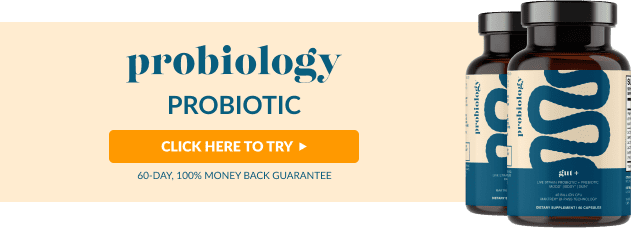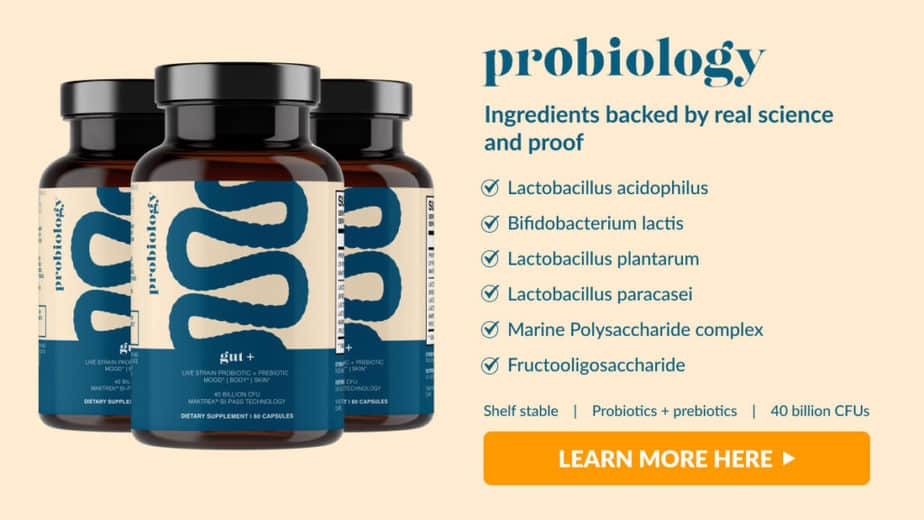There are trillions of bacteria inside the human body. For the most part, these bacteria are harmless. But within those numbers there are some bacteria that are helpful, and some that cause illness. We consider these bacteria to be “good” or “bad.”
IBS is a common digestive disorder, and afflicts women much more than men, with about 70 percent of the sufferers being female.
Probiotics, a form of friendly bacteria, are believed to keep the balance of bacteria in check, and help maintain a healthy gut.
Having the right balance of bacteria in the gut is vital for a healthy body. When the gut flora falls out of balance, bad bacteria can multiply, leading to illness. For people with IBS, when bad bacteria flourish, it can cause a serious flare-up of symptoms.
Keeping your gut flora in order is a part of managing IBS. Probiotics could potentially be a way to maintain that balance. This article will cover the best probiotics for IBS.
If you’re in a hurry, these are the recommended probiotics and a tasty probiotic yogurt for IBS:

But before you add probiotics to your treatment, it’s important to understand what they are, how they work, and what probiotics might be right for you.
What Are Probiotics?
Probiotics mean “for life.” They are living microorganisms, live bacteria, which provide health benefits beyond basic nutrition. They are intended to protect the gut against harmful bacteria, either by working as an antibiotic, or strengthening the support of the digestive tract.
Probiotics help healthy people by strengthening the immune system, maintaining normal GI function and preventing infection. Health advantages range from calming upset stomachs to preventing liver damage and yeast infections. Many live bacteria found in probiotics naturally live in our digestive systems.
Probiotics help our bodies fight “bad” bacteria. Good intestinal flora protect us against infection. Probiotics alleviate intestinal disorders that are caused by a disruption of the normal flora in the GI tract due to antibiotics, poor diet or surgery, which all can make us more susceptible to disease.
Probiotics naturally occur almost exclusively in dairy products or fermented foods like kimchi, sauerkraut and kefir. When taking a probiotic supplement, the number of “good” bacteria in the gut increases.
However, there are many types of bacteria in the human gut, and we haven’t identified what all of them are, nor what all of them do. This can make introducing new (good) bacteria tricky, because it’s hard to be sure exactly what it needs to target.
Research continues to uncover many potential benefits of probiotics. Studies show probiotics play a major role in the intestinal ecosystem by producing organic acids and reducing the pH. Probiotics may also have effects on allergies, infections, cholesterol levels and high blood pressure.
Research into treating IBS with probiotics is ongoing. Although there are some positive initial results, plenty of work is still needed.
Best Probiotics for IBS
The majority of research has shown two families to consider strains from: Lactobacillus and Bifidobacterium.
When it comes to brands, there are a few worth considering:
- Probiology – Probiology contains the key probiotic strains and delivers 40 billion CFUs, along with prebiotics for gut health benefits.
- Align – Align contains the Bifidobacterium 35624 probiotic strain, which naturally works to add good bacteria to your digestive system.
- Culturelle – The Culturelle Daily Probiotic contains the Lactobacillus rhamnosus (LGG) probiotic strain.
- VSL#3 – VSL#3 has been shown as safe and effective at treating IBS in some studies. It contains multiple strains of the Lactobacillus and Bifidobacterium family.
- Alflorex – A single strain probiotic containing only bifidobacterium infantis 35624, Alflorex is a popular probiotic choice. This strain has been shown to be superior in placebo trials, causing a reduction in symptoms.
What Research is there Supporting Probiotics for IBS?
IBS is a complicated illness, with many causes and symptoms. It’s a chronic condition causing abdominal pain, cramping, constipation and/or diarrhea. These painful symptoms have been reported by 10 to 20 percent of adults in the U.S. They are responsible for over 3 million doctor visits annually.
Recent studies show that probiotics may make a significant difference if you suffer from IBS. However, it can be difficult to determine which probiotics are best used, and when.
The American College of Gastroenterology presented a study contrasting a probiotic with a placebo. Those who received the probiotics experienced significant improvement in bowel habits and reduced IBS symptoms.
A 2015 study used a randomized, placebo controlled method to monitor the effect of probiotics on those suffering with IBS. The results showed that use of a probiotic reduced pain and other symptoms, compared to those who had taken the placebo.
In 2021, further studies into the use of multi-strain probiotics for those suffering from diarrhea-predominant IBS also showed promising results. Those using probiotics showed significant improvement compared to patients given the placebo.
However, at this stage there are still questions as to how these probiotics work, and how great a benefit they can actually provide. A 2018 review agreed that while the early data was promising, there’s still much that we need to learn, comparable to a 2014 review with similar results.
While this may seem like a mixed result, many are hopeful. In some instances, probiotics do appear to alleviate symptoms and signs of IBS when compared to a placebo. It just isn’t always quite so clear.
Because of this, it’s important to ensure that if you intend to add probiotics to your treatment plan, you choose the right ones. Sometimes this takes trial and error to find the right probiotic for you.
Are There Any Side Effects to Taking Probiotics?
Current research indicates that probiotics are largely safe to consume, with limited potential side effects.
However, there are a few things to keep in mind before using probiotics.
Tests have shown that probiotics can contain hidden allergens, which could cause a reaction in those with a food intolerance.
Probiotics are adding bacteria to the gut. This can, potentially, cause a worsening of IBS symptoms, or induce a flare-up. Gas and bloating are both potential side effects for those first using probiotics. These symptoms may ease as the gut gets used to the probiotic.
Probiotics in the U.S. are classed as dietary supplements, rather than medication. That means the manufacturing and marketing of them is less closely regulated. Always buy probiotics from trusted manufacturers, and be sure to research the brand before using.
Largely, probiotics are safe to use, even if they aren’t always effective. However, if you’re on other medication, suffer from allergies, or use a low FODMAP diet to handle IBS symptoms, speak to a medical professional before trying probiotics.
Choosing the Best Probiotics for IBS
Probiotics play such an important role in stimulating digestive health, creating a healthy immune system, and possibly preventing obesity that they are going mainstream.
There are two things that have to be considered when choosing a probiotic to treat IBS.
First, you must consider the type of probiotic, and how well researched it is. There are various probiotics available, and although some are well-researched, others have little supporting evidence.
Second, it’s vital to consider the type of IBS being treated. Probiotics which have shown impressive results in easing certain symptoms will be no use against other forms of IBS.
Probiotics, as with most IBS treatments, are not “one size fits all.”
Probiotics for Diarrhea
IBS associated with frequent diarrhea is known as IBS-D. Probiotics for IBS-D may help to regulate bowel movements, and alleviate abdominal pain. Research into probiotics to treat IBS-D and diarrhea has shown some positive results.
Saccharomyces Boulardii is a friendly yeast which has been identified as a good probiotic for those suffering from diarrhea. This is a transient probiotic, which passes through the gut rather than colonizing it.
A 2014 trial found that combining Saccharomyces boulardii with the fiber ispaghula husk improved quality of life in patients struggling with IBS-D.
Probiotics For Constipation
When IBS is primarily related to constipation, this is known as IBS-C. Painful and distressing to live with, those suffering from IBS-C may consider a probiotic as a form of treatment.
Bifidobacterium lactis was shown, in a 2015 study, to support gut health, and promote regular bowel movement.
A 2016 study tested multi-strain probiotics and their effects on IBS-C. The results of the study were positive, with more patients responding to the probiotic than the placebo. This study tested strains of the Lactobacillus species, including L.acidophilus, L.reuteri, L.plantarum, and L.rhamnosus.
Based on these studies, if you’re suffering from IBS-C, a probiotic containing stains of the Lactobacillus family could provide relief.
Probiotics and a Low FODMAP Diet
A low FODMAP diet is often recommended to IBS patients learning how to manage the condition. FODMAPs are short-chain carbohydrates, found in common foods, that the body struggles to digest.
A low FODMAP diet will remove foods that are high in these carbohydrates, before slowly reintroducing them. The aim is to determine which FODMAPs cause an individual reaction, and should be avoided.
If you’re starting a low FODMAP diet, then avoid using probiotics for the first time. As they alter the flora of the gut, it’s difficult to get a clear picture of which FODMAPs may be causing a reaction.
Probiotics can also cause an increase in symptoms, particularly through the first few weeks of use.
Those already using probiotics prior to starting a low FODMAP diet don’t need to stop.
Probiotics and Other Foods
Eating certain foods can help probiotics multiply in your body. Food and drinks like apples, beans, berries, red wine, spices, and teas all help. Increasing cultured dairy products like cheese, kefir, and yogurt will help.
Yogurts are a popular way to ingest more probiotics to help the body’s digestive system. A good plan is to eat yogurt daily for at least two weeks.
Dannon’s Activia Yogurt is one of the most popular yogurts with probiotics. Activia can help reduce the food transit time in gut and the long intestine by up to 40 percent. Each yogurt cup contains billions of live probiotic cultures that land in the large intestine to do their magic.
Probiotics for IBS Final Thoughts
Research indicates that probiotics may help alleviate symptoms of IBS.
However, it’s important to use the right ones for your IBS. Consider your own symptoms, and what you’re hoping to achieve with a probiotic.
Remember, everyone has a different balance of bacteria in their body. No probiotic is guaranteed to work with your unique microbiome.
There’s still much to learn about probiotics and how they affect our gut. If you do intend to add probiotics to your treatment plan, speak with a medical professional to find out what’s best for you.

Check out these related articles on probiotics and IBS:







